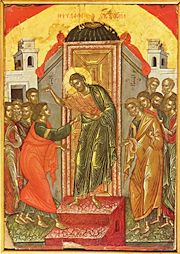Difference between revisions of "Sunday of St. Thomas"
m (various minor cleanups Ⓣ) |
(more on Antipascha) |
||
| Line 2: | Line 2: | ||
The Sunday after [[Easter]] is the '''Sunday of St. Thomas''', also known as '''Second Sunday''' or '''Antipascha''' ("opposite" Pascha, i.e., at the other end of [[Bright Week]]). Historically, this day in the early Church was the day that the [[baptize|newly-baptized]] Christians removed their robes and entered once again into the life of this world. | The Sunday after [[Easter]] is the '''Sunday of St. Thomas''', also known as '''Second Sunday''' or '''Antipascha''' ("opposite" Pascha, i.e., at the other end of [[Bright Week]]). Historically, this day in the early Church was the day that the [[baptize|newly-baptized]] Christians removed their robes and entered once again into the life of this world. | ||
| − | The Orthodox Church dedicates every Sunday of the year to the Lord's Resurrection starting on this Sunday, the eighth day of the [[pascha]]l celebration, the last day of [[Bright Week]]. | + | This day is also known as '''Antipascha'''. This does not mean "o''pposed to Pascha,"'' but ''"in place of Pascha."'' Beginning with this first Sunday after Pascha, the Church dedicates every Sunday of the year to the Lord's Resurrection. Sunday is called "Resurrection" in Russian, and "the Lord's Day" in Greek.The Orthodox Church dedicates every Sunday of the year to the Lord's Resurrection starting on this Sunday, the eighth day of the [[pascha]]l celebration, the last day of [[Bright Week]]. |
==Celebration of the feast== | ==Celebration of the feast== | ||
Revision as of 12:27, April 2, 2010
The Sunday after Easter is the Sunday of St. Thomas, also known as Second Sunday or Antipascha ("opposite" Pascha, i.e., at the other end of Bright Week). Historically, this day in the early Church was the day that the newly-baptized Christians removed their robes and entered once again into the life of this world.
This day is also known as Antipascha. This does not mean "opposed to Pascha," but "in place of Pascha." Beginning with this first Sunday after Pascha, the Church dedicates every Sunday of the year to the Lord's Resurrection. Sunday is called "Resurrection" in Russian, and "the Lord's Day" in Greek.The Orthodox Church dedicates every Sunday of the year to the Lord's Resurrection starting on this Sunday, the eighth day of the paschal celebration, the last day of Bright Week.
Celebration of the feast
Liturgically, the Church remembers the Apostle Thomas' vision of Christ after eight days. At that time he said to Thomas, "Put your finger here, and see my hands; and put out your hand, and place it in my side; do not be faithless, but believing." Thomas answered him, "My Lord and my God!" Jesus said to him, "Have you believed because you have seen me? Blessed are those who have not seen and yet believe" (John 20:26-29).
As with all the services until the feast of Ascension the Easter Troparion is sung, and the epistle readings are taken from the Book of Acts, telling us of the first Christians who lived in communion with the Risen Lord. Finally, the gospel readings are from the Gospel of John, considered by many to be a gospel written particularly for the newly baptized.
Hymns
Troparion (Tone 7)
- From the sealed tomb, You did shine forth, O Life!
- Through closed doors You did come to Your disciples, O Christ God!
- Renew in us, through them, an upright spirit,
- By the greatness of Your mercy, O Resurrection of all!
Kontakion (Tone 8)
- Thomas touched Your life-giving side with an eager hand, O Christ God,
- When You did come to Your apostles through closed doors.
- He cried out with all: You are my Lord and my God!
